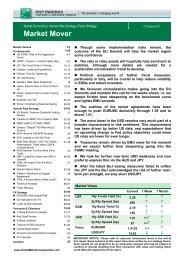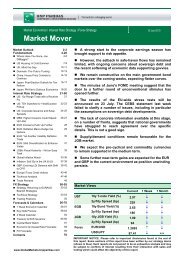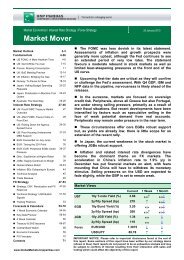Market Outlook - BNP PARIBAS - Investment Services India
Market Outlook - BNP PARIBAS - Investment Services India
Market Outlook - BNP PARIBAS - Investment Services India
Create successful ePaper yourself
Turn your PDF publications into a flip-book with our unique Google optimized e-Paper software.
UK: Top Of The Hill• The September reading of UK consumerprice inflation showed it surging to 5.2%, upfrom 4.5% in August.• But we and the MPC expect it to fall sharplynext year.• Indeed, the risks are on the downside andthe MPC will need to consider more QE byFebruary.The September reading of UK consumer priceinflation showed it surging to 5.2% y/y, up from 4.5%in August. That represents the highest annual rate ofCPI inflation since September 2008.Of the 0.7pp rise in inflation, 0.45pp was accountedfor by higher utility bills. That was in line with our ownexpectations. But on top of this effect, transportprices also contributed to a higher reading. Betweenthis August and September transport prices declinedby 2.1%, compared with 3.4% a year ago. That wasdue to a smaller fall in air fares this September thanlast year, as well as in sea fares. Overall, transportadded 0.2pp to the annual CPI inflation rate. Thesmaller jump in the RPI annual rate, from 5.2% to5.6%, partly reflects lower weights for air and seafares in the index.We expect inflation to remain above 5% in October,though declining to 5.1%. RPI inflation should movedown to 5.5% next month. Despite the high currentrate, the Bank of England’s Monetary PolicyCommittee remains quite convinced that inflation willdrop sharply next year and we would broadly agreewith that.There are a number of reasons why we can beconfident of a sharp fall back. For one, the rate ofVAT rose by 2.5pp in January 2011 and this will dropout of the twelve-month inflation calculation over thefirst quarter of 2012 (assuming some gradual passthroughof the rise). That alone should see at least1pp off the annual inflation rate. But on top of thisimpact, many of the upside commodity induced risesin inflation look to have peaked. For example, globalfood prices appear to have flattened off, while UKwholesale energy prices have done likewise.In the bigger picture, since 2008 UK consumer priceshave increased by around 7.5% more than in theeurozone and the US. As the Bank of England isfond of pointing out, virtually all of that difference canbe accounted for by the impact of the fall in the valueof sterling and the subsequent rise in import prices.13012512011511010510095908580Chart 1: UK, US and Eurozone CPI Since 2008Jan 2008 Jul 2008 Jan 2009 Jul 2009 Jan 2010 Jul 2010 Jan 2011 Jul 2011Source BloombergUK CPIUS CPIEurozone CPIUK Import pricesSince 2008 import prices excluding energy haverisen by around 25%. Once allowance is also madefor the rise in VAT, that can account for thedifference in CPI performance.In the medium term, as these effects wash out thedata, UK consumer price inflation should begin tobetter reflect underlining domestically generatedinflation. And here evidence suggests inflationarypressure is very restrained, with annualised unitlabour growth in the second quarter of 1.1%.This week’s MPC minutes to the October meetingunderlined the Committee’s belief that inflation willfall sharply next year. Indeed, the growing downsiderisks facing UK demand growth were described ashaving increased “significantly” since the AugustInflation Report. That reflects the Committee’sconcern about the weakening in the UK’s mainexport markets, as well as the impact that financialmarket tensions may have on credit conditions. Infact, the MPC now think it is more likely that inflationwill undershoot the 2% target in the medium term,and the available indicators suggested that growth inQ4 would be “close to zero”. The Committee,therefore, found the case for an extension of QE“compelling”.We believe the risks are to the downside of theCommittee’s view that GDP will be flat in Q4, withrecent surveys suggesting a contraction is morelikely. Moreover the shock to household incomesfrom higher utility bills will also knock spendingvolumes in due course. It therefore remains likelythat the macroeconomic backdrop to theCommittee’s meetings early in the new year will notbe auspicious, and we look for it to agree anotherextension to quantitative easing by February.David Tinsley 20 October 2011<strong>Market</strong> Mover10www.Global<strong>Market</strong>s.bnpparibas.com
















